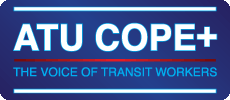Final Countdown to New Contract
Local 1700 to welcome more than 130 new members across Southwest hired from now-disbanded subsidiaries
Greyhound drivers and mechanics overwhelmingly ratified a path-breaking agreement on Feb. 1, and last-minute preparations continue before the contract goes into effect on April 1.
Printing presses are running off the new Memorandum of Understanding, and Local 1700 and Greyhound are developing a new system to train union stewards in early April to enforce it.
In April, drivers will begin receiving pay raises and compensation for some previously unpaid service. The new contract adds $55 million into wages and benefits. All work will be paid by 2017, when the last phase of the 5-year agreement goes into effect. The new contract also provides incentives for employees to work in urban areas that are hardest to staff.
The other major change will take place on May 1, when Greyhound has agreed to return all work it had farmed out to its now-disbanded subsidiaries. The company is hiring about 130 former Americanos and Crucero drivers, who will bypass a probationary period but must be able to pass an English exam. Management backed away in negotiations from their proposal to pay the new hires less than veteran drivers.
Local 1700 President Sandra Frye said Greyhound has thrown in the towel on a strategy that provided second-class service to Hispanic passengers and divided drivers for years.
“We stuck to our principles and prevailed,” Frye said. “In that spirit of solidarity, I hope all Local 1700 members will welcome these newest members to the ATU family.”
San Diego will be one of the most affected cities. Chief Steward Mike Rose anticipates that Greyhound will hire more than 30 Americanos and Crucero drivers for runs formerly operated by the subsidiaries. Rose said many of the applicants are apprehensive about the change.
“First, there’s the language requirement. Some are fluent in English and others need practice,” Rose said. “But also the companies operate differently on several levels, from uniforms to equipment to how drivers report to work.”
Fernando Ochoa is thrilled to make the jump. Ochoa, who lives in a Los Angeles suburb, has driven buses for Americanos, Veolia and L.A. rapid transit for 10 years. Ochoa said he will be proud to work for “the number one bus company in the U.S., and one of the best in the world.”
Besides the added prestige, Ochoa said, higher salary and improved benefits will be welcome in these tough economic times. He praised Rose and Local 1700 members for excellent communication and the compañerismo – solidarity – they have shown the soon-to-be union brothers.
Veteran Greyhound drivers will also have to demonstrate some level of Spanish language competency to operate “bilingual runs,” which are defined as having at least 40% of Spanish-speaking passengers and either begin or end at a border city. Rose said the details for proving basic fluency are still being worked out.
“We think the threshold should be set low. We want to be able to provide an enjoyable experience for our customers. That means telling them when to change buses and other basic things, not chatting away. We have schedules to keep.”







